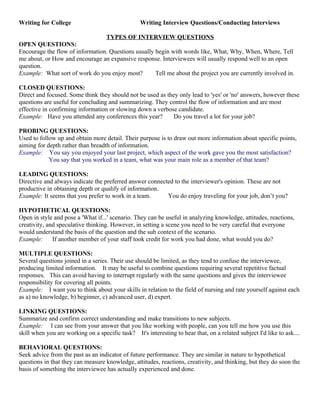
Sp interview question types
- 1. Writing for College Writing Interview Questions/Conducting Interviews TYPES OF INTERVIEW QUESTIONS OPEN QUESTIONS: Encourage the flow of information. Questions usually begin with words like, What, Why, When, Where, Tell me about, or How and encourage an expansive response. Interviewees will usually respond well to an open question. Example: What sort of work do you enjoy most? Tell me about the project you are currently involved in. CLOSED QUESTIONS: Direct and focused. Some think they should not be used as they only lead to 'yes' or 'no' answers, however these questions are useful for concluding and summarizing. They control the flow of information and are most effective in confirming information or slowing down a verbose candidate. Example: Have you attended any conferences this year? Do you travel a lot for your job? PROBING QUESTIONS: Used to follow up and obtain more detail. Their purpose is to draw out more information about specific points, aiming for depth rather than breadth of information. Example: You say you enjoyed your last project, which aspect of the work gave you the most satisfaction? You say that you worked in a team, what was your main role as a member of that team? LEADING QUESTIONS: Directive and always indicate the preferred answer connected to the interviewer's opinion. These are not productive in obtaining depth or qualify of information. Example: It seems that you prefer to work in a team. You do enjoy traveling for your job, don’t you? HYPOTHETICAL QUESTIONS: Open in style and pose a 'What if...' scenario. They can be useful in analyzing knowledge, attitudes, reactions, creativity, and speculative thinking. However, in setting a scene you need to be very careful that everyone would understand the basis of the question and the sub context of the scenario. Example: If another member of your staff took credit for work you had done, what would you do? MULTIPLE QUESTIONS: Several questions joined in a series. Their use should be limited, as they tend to confuse the interviewee, producing limited information. It may be useful to combine questions requiring several repetitive factual responses. This can avoid having to interrupt regularly with the same questions and gives the interviewee responsibility for covering all points. Example: I want you to think about your skills in relation to the field of nursing and rate yourself against each as a) no knowledge, b) beginner, c) advanced user, d) expert. LINKING QUESTIONS: Summarize and confirm correct understanding and make transitions to new subjects. Example: I can see from your answer that you like working with people, can you tell me how you use this skill when you are working on a specific task? It's interesting to hear that, on a related subject I'd like to ask.... BEHAVIORAL QUESTIONS: Seek advice from the past as an indicator of future performance. They are similar in nature to hypothetical questions in that they can measure knowledge, attitudes, reactions, creativity, and thinking, but they do soon the basis of something the interviewee has actually experienced and done.
- 2. CONDUCTING INTERVIEWS Listening to answers and concentrating on the candidate! Asking good questions is only half the task of the interviewer. Close attention must be paid to the answers. Here are some ideas for active listening and maintaining concentration: Active, Attentive Listening This is an important skill for interviewers to develop, Most of us have learned that it is quite difficult to listen when we are speaking, and therefore the first rule of effective listening is to stop talking. This includes talking to ourselves, particularly if you are thinking of what to say next. Careful listening and analyzing of what is said and what is left unsaid are keys to being an effective interviewer. Remember this quote – “I learn little when I am talking!” Concentrate fully on the interviewee and avoid other distractions. It can be distracting and rude to the interviewee if you are not focused entirely on him or her. Summarize and Paraphrase Regularly summarizing what the interviewee has said is an active listening skill that will not only clarify the content and ensure understanding but will keep you focused on the him or her. Interviewers should paraphrase regularly to check that they have correctly heard and understood what has been said. There are many possible barriers between the interviewer and the interviewee such as position, education, experience, status, age, gender, race etc. All have a bearing on how individuals will interpret information. Repeating what we have heard will check any perception distortions that may have occurred. This process also reassures the interviewee that you are interested and involved in what he or she has to say. Approach and Style The interviewer's approach and style of questioning should establish rapport, put the interviewee at ease, and show genuine interest. The attitude should be fair and equitable, reinforcing, and supporting, reflecting empathy or the ability to understand the other's feelings from his or her perspective. Interview Assignment: You need to interview someone in the field that you are researching. Your interview should contain anywhere between 10-15 questions. The interview will be due on Tuesday, December 21, 2010. You will be able to include the information from your interview in your paper.